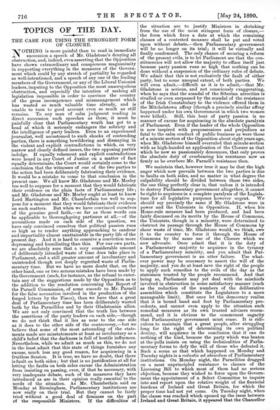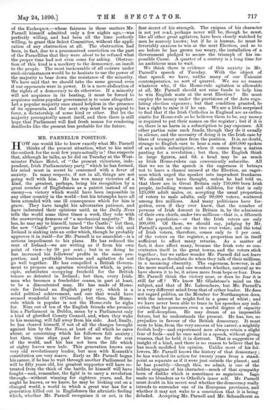TOPICS OF • THE DAY.
THE CASE FOR USING THE STRONGEST FORM OF CLOSURE. NOTHING is more painful than to read in immediate succession a speech of Mr. Gladstone's denying all obstruction, and, indeed, even asserting that the Opposition have shown extraordinary and conspicuous magnanimity in supporting everything in the measures of the Govern- ment which could by any stretch of partiality be regarded as well-intentioned, and a speech of any one of the leading members of the Government, or any of the Liberal Unionist leaders, imputing to the Opposition the most unscrupulous obstruction, and especially the intention of making all legislation impossible in order to convince the country of the gross incompetence and mismanagement which has wasted so much valuable time already, and is unable to turn to good account even so much as still remains. To any man of calm judgment reading in direct succession such speeches as these, it must be painfully clear that Parliamentary wrath has got to a head at which it seriously endangers the sobriety and the intelligence of party leaders. Even to an experienced journalist, well accustomed to such shocks of contending parties, there is something bewildering and dismaying in the violent and explicit contradictions in which, on very narrow and clearly defined issues, the two opposing parties indulge. If equally vehement and explicit contradictions were heard in any Court of Justice on a matter of fact equally determinate, the Court would certainly come to the conclusion that the witnesses of one of the two parties to the action had been deliberately fabricating their evidence. It would be a mistake to come to that conclusion in the present case. We all know Mr. Gladstone and Mr. Morley too well to suppose for a moment that they would fabricate their evidence on the plain facts of Parliamentary life ; and Mr. Gladstone and Mr. Morley ought at least to know Lord Hartington and Mr. Chamberlain too well to sup- pose for a moment that they would fabricate their evidence on such matters. But when we have convinced ourselves of the genuine good faith,—so far as those words can be applicable to thoroughgoing partisans at all,—of the accusations made on each side of the question, we have only convinced ourselves that political passion runs so high as to render anything approaching to candour and impartiality almost unattainable in the party life of the present day. And it is hard to conceive a conviction more depressing and humiliating than this. For our own parts, we are absolutely sure that a very considerable amount of deliberately intended waste of time does take place in Parliament, and a still greater amount of involuntary and unintended though not deeply regretted waste of Parlia- mentary time. But we have no more doubt that, on the other hand, one or two serious mistakes have been made by the Government (such, for instance, as the refusal to enter- tain any of the suggestions made by the Opposition as to the addition to the resolution concerning the Report of the Parnell Commission, of some amen& to Mr. Parnell for the false accusation involved in the production of the forged letters by the Times), than we have that a great deal of Parliamentary time has been deliberately wasted both by the Parnellites and by their Gladstonian allies. We are not only convinced that the truth lies between the assertions of the party leaders on each side,—though we do not think that it lies as near to the one side as it does to the other side of the controversy,—but we believe that some of the most astounding of the state- ments made are misstatements at least as involuntary as a child's belief that the darkness is full of hostile influences. Nevertheless, while we admit as much as this, we do not in the least admit that this state of things furnishes any excuse, much less any good reason, for acquiescing in a fruitless Session. It is true, we have no doubt, that there is fault on both sides ; but that is no justification at all for letting the faults on both sides excuse the Administration from insisting on passing, even, if that be necessary, with very inadequate debate, such of the measures they have introduced as are in their opinion really essential to the needs of the situation. As Mr. Chamberlain said on Monday at Birmingham, Parliamentary institutions are now really on their trial. But they cannot be fairly tried without a. good deal of firmness on the part of the responsible Ministers. If the difficulties of the situation are to justify Ministers in shrinking from the use of the most stringent form of closure,— the form which fixes a date at which the remaining clauses of a contested measure shall be put and voted upon without debate,—then Parliamentary government will be no longer on its trial; it will be virtually and finally condemned. The only chance of securing a reform of the present evils, is to let Parliament see that the con- stituencies will not allow the majority to efface itself just because party passion runs so high that nothing can be done without a suspension of the ordinary rules of debate_ We admit that this is not exclusively the fault of either party, but to some unequal extent, of both parties. We will even admit,—difficult as it is to admit,—that Mr. Gladstone is serious, and not consciously exaggerating, when he says that the scandal of the Siberian atrocities is rivalled or even surpassed by the scandal of the resistance of the Irish Constabulary to the violence offered them in the Mitchelstown affray (though a precisely similar affray happened under his own Government in which two women were killed). Still, this heat of party passion is no manner of excuse for acquiescing in the absolute paralysis of Parliament. Even if the leader of the whole Opposition is now inspired with prepossessions and prejudices as fatal to the calm conduct of public business as were those of a minute section of the Opposition about eight years ago, when Mr. Gladstone himself overruled that minute section with as high-handed an application of the Closure as that which he now so passionately denounces, that only proves the absolute duty of overbearing his resistance now as firmly as he overbore Mr. Parnell's resistance then.
We maintain that, however true it may be that the high anger which now prevails between the two parties is due to faults on both sides, and no matter in what degree the culpability should be divided between those two sides, the one thing perfectly clear is, that unless it is intended to destroy Parliamentary government altogether, it cannot be right to acquiesce in a complete paralysis of the Legisla- ture for all legislative purposes however urgent. We should say precisely the same if Mr. Gladstone were in power and the Unionists in Opposition. If, when his Home-rule measure had been produced, and had been fairly discussed on its merits by the House of Commons, the Unionists, though in a minority, were determined to. obstruct its passage through the House of Commons by sheer waste of time, Mr. Gladstone would, we think, owe it to the country to force it through the House of Commons by the same use of the Closure which we now advocate. Once admit that it is the duty of a Parliamentary majority to acquiesce in the tyranny of a Parliamentary minority, and you admit that Par- liamentary government is an utter failure. Use what- ever power may be necessary to assert the will of the majority, and you do at least save the right of the people to apply such remedies to the evils of the day as the statesmen trusted by the people recommend. And that being so, Parliament may yet deal with the mischiefs involved in obstruction in some satisfactory manner (such as the reduction of the numbers of the deliberative assemblies which constitute the Legislature to a more manageable limit). But once let the democracy realise that it is bound hand and foot by Parliamentary pre- cedents, and cannot even apply to the situation such remedial measures as its own trusted advisers recom- mend, and it is obvious to the commonest sagacity that Parliamentary government must cease. It is ridi- culous to maintain that a great people, after struggling long for the right of determining its own political destiny, will acquiesce in the conclusion that it can do nothing of the kind, because the party which was beaten at the polls insists on using the technicalities of Parlia- mentary forms to defy the will of those who defeated it. Such a scene as that which happened on Monday and Tuesday nights is a reduetio ad absurdum of Parliamentary institutions. On Monday night, the Parnellites dragged on a most unprincipled resistance to clauses of the Licensing Bill to which most of them had no serious objection, because they wished to force upon the Govern- ment the appointment of a Select Committee to inquire into and report upon the relative weight of the financial burdens of Ireland and Great Britain, for which the proper time had not yet come. On Tuesday night, when the clause was reached which opened up the issue between Ireland and Great Britain, it appeared that the Chancellor of the Exchequer,—whose fairness in these matters Mr. Parnell himself admitted only a few nights ago,—was perfectly willing, and had been all the time perfectly willing, to grant this Select Committee, without the appli- cation of any obstruction at all. The obstruction had. been, in fact, due to a preconceived conviction on the part of the Parnellites that they were about to be refused what the proper time had not even come for asking. Obstruc- tion of this kind is a mockery to the democracy, an insult to the people. The most inexcusable of all courses under such circumstances would be to hesitate to use the power of the majority to bear down the resistance of the minority. We have said that we should take the same ground even if our opponents were in power. It is a mere abdication of the rights of a democracy to do otherwise. If a minority will not acquiesce in its beating, it must be forced to acquiesce unless popular government is to cease altogether. Let a popular majority once stand helpless in the presence of its opponents, and the next step must be an appeal to force, a dictatorship of some kind or other. But let the majority peremptorily assert itself, and then there is still hope that Parliament will find fresh means for rendering deadlocks like the present less probable for the future.



































 Previous page
Previous page